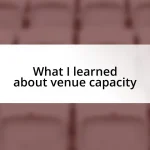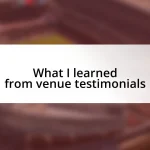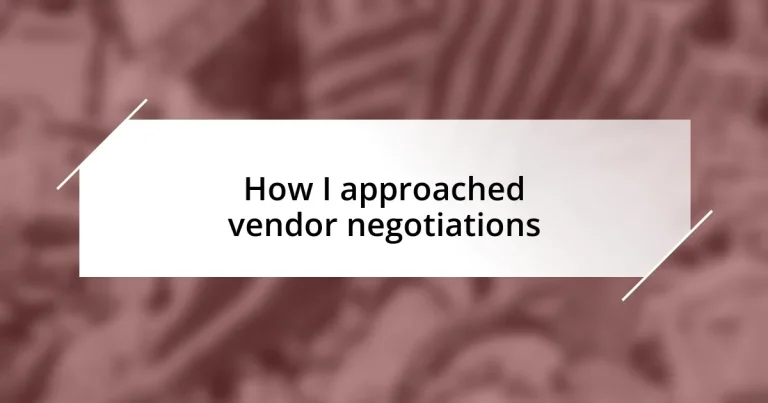Key takeaways:
- View vendor negotiations as collaborative partnerships, focusing on building rapport and understanding motivations for better outcomes.
- Prepare thoroughly by gathering information, setting clear objectives, and rehearsing potential scenarios to boost confidence during negotiations.
- Utilize emotional intelligence by practicing active listening, showing empathy, and maintaining a positive attitude to foster trust and cooperation.
- After closing a deal, document agreements clearly, express appreciation, and keep the door open for future conversations to maintain strong vendor relationships.
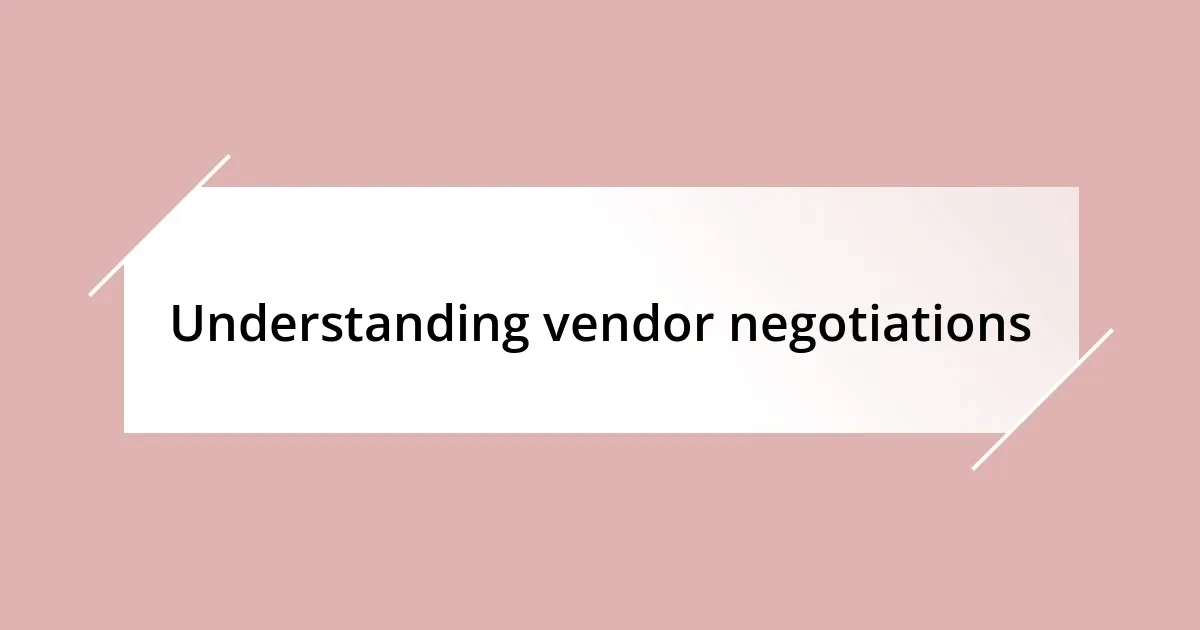
Understanding vendor negotiations
Vendor negotiations can feel a bit like a dance—each side has its own rhythm and steps. I remember walking into my first negotiation, heart racing, unsure if I could match the confident demeanor of the vendor on the other side. Have you ever felt that nervous energy? It’s a common experience, but understanding the dynamics at play can really help you find your footing.
When negotiating with vendors, my approach has always been to see it as a collaborative partnership rather than a combative exchange. I’ve discovered that building rapport, asking open-ended questions, and genuinely listening to their concerns can lead to more favorable terms for both parties. It’s amazing how much can be achieved when both sides feel heard and valued.
Delving into vendor negotiations requires a bit of strategy and planning. For instance, I often take the time to analyze the vendor’s position and identify potential areas of flexibility. Have you ever thought about what drives their pricing decisions? Knowing their motivations allows me to craft a proposal that aligns with their goals while also supporting my own needs. This kind of insight not only strengthens my bargaining position but also deepens the relationship with the vendor, turning negotiations into opportunities for collaboration.
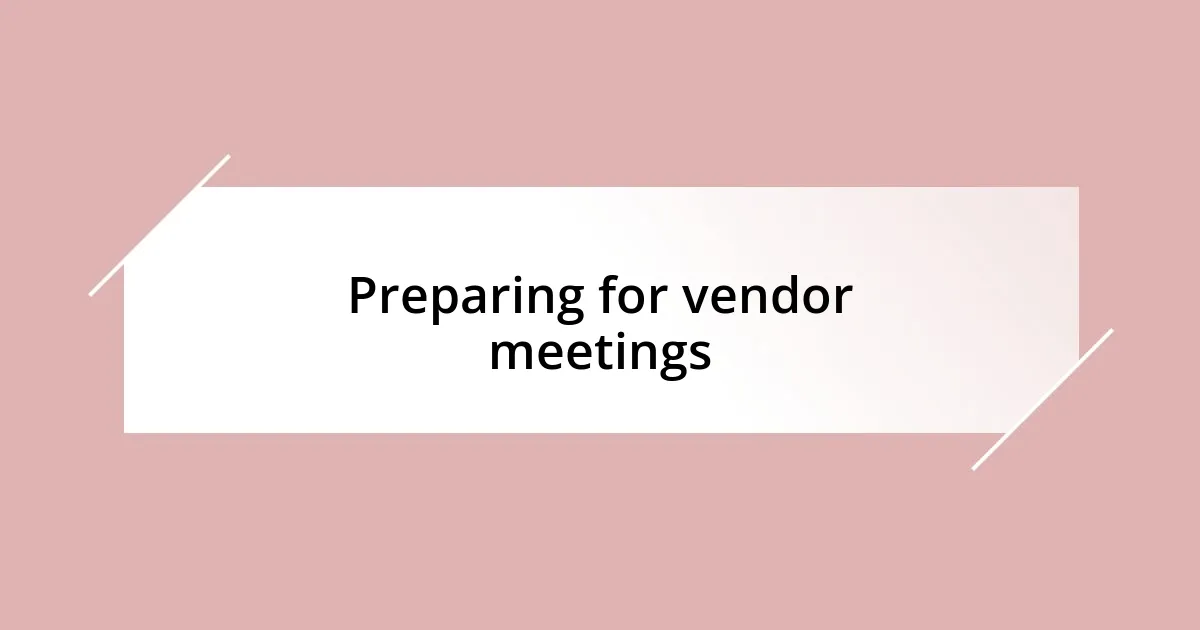
Preparing for vendor meetings
When preparing for vendor meetings, I always start by gathering as much relevant information as I can. I remember a time when I was completely blindsided by unexpected terms because I hadn’t done my homework. It was a lesson learned: understanding a vendor’s background, market position, and previous contracts can provide a crucial edge in negotiations. It’s like arming yourself with knowledge that empowers your conversations.
Another key aspect for me is setting clear objectives. I jot down what I hope to achieve from the meeting beforehand. Reflecting on my early experiences, I once walked into a meeting without clear goals, and I ended up settling for less. Having specific objectives not only clarifies my own position but also helps me steer the discussion effectively. Have you ever had a conversation where you felt like you were just going in circles? That’s a sign of not being clear on your goals!
Lastly, rehearsing potential scenarios can significantly enhance my confidence. I practice common objections and responses out loud. I vividly remember sitting in my car before a big meeting, running through my notes and responses to anticipated questions. That moment of preparation helped me feel grounded and ready. When the actual negotiation began, I was able to adapt seamlessly instead of fumbling through unexpected challenges. Preparing in this way can transform how you engage with vendors, making it feel less intimidating and more rewarding.
| Preparation Strategy | Description |
|---|---|
| Gather Information | Research the vendor’s background and market to understand their motivations. |
| Set Clear Objectives | Define specific goals for the meeting to guide the negotiation. |
| Practice Scenarios | Rehearse potential objections and responses to build confidence. |
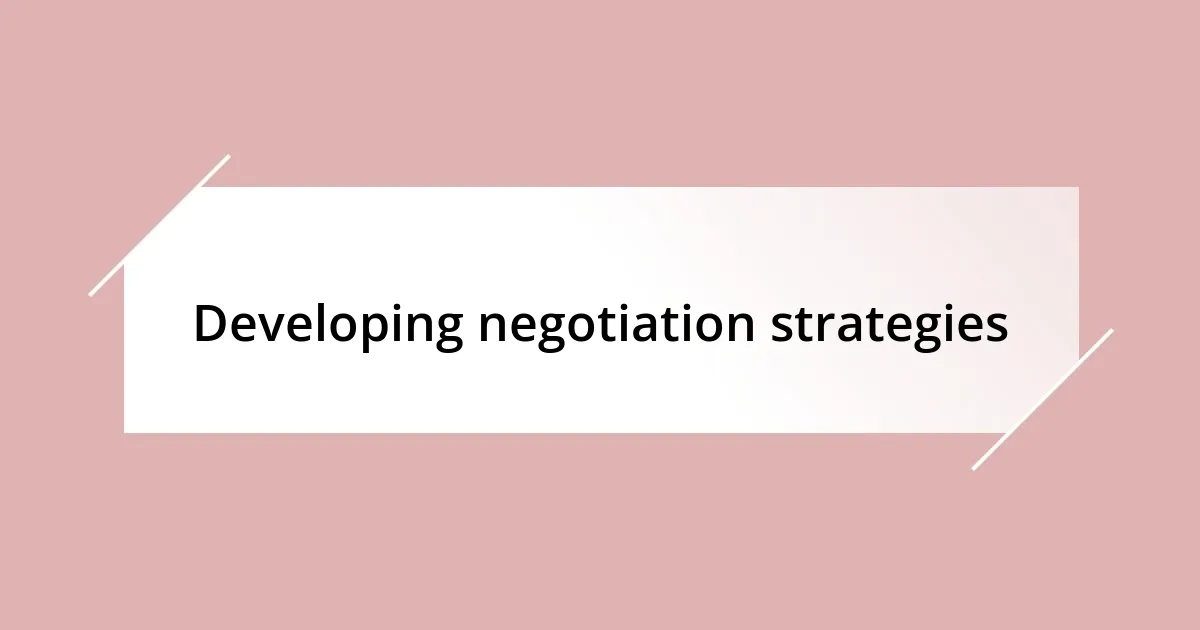
Developing negotiation strategies
Developing effective negotiation strategies requires a blend of analytical thinking and emotional intelligence. I remember a pivotal moment when I realized that understanding the vendor’s business model was invaluable. During one negotiation, the vendor mentioned their push for sustainable practices. I leveraged this to propose a partnership that would enhance their brand image while securing better pricing for my company. This experience solidified my belief that aligning strategies can create a win-win situation.
Here are some strategies I’ve found particularly useful:
- Know Your Value: Articulate what your business brings to the table. I discovered that showcasing our unique selling points often gave me more leverage.
- Be Flexible: Sometimes, being rigid can undermine negotiations. I learned to adapt my expectations based on the vendor’s constraints, which led to more fruitful discussions.
- Establish a Clear Communication Plan: Having simple, direct communication can prevent misunderstandings. I once sent a follow-up email within 24 hours after a negotiation to summarize our discussion, which proved crucial in maintaining clarity.
The power of preparation goes beyond just facts and figures; it encompasses understanding the emotions tied to negotiations. I learned early on that approaching these discussions with empathy could shift the tone significantly. During one negotiation with a vendor anticipating layoffs, I opted for a compassionate dialogue that opened up space for creative solutions. This not only built trust but also fostered a collaborative spirit, making the negotiations feel less adversarial.
In practical terms, here are strategies to enhance emotional intelligence during negotiations:
- Active Listening: Tune into not just the words spoken, but the emotions behind them. I often nod and paraphrase points back to show I’m engaged.
- Empathy Mapping: Try to understand what the vendor might be feeling. I visualize their concerns to tailor my proposals more thoughtfully.
- Maintain a Positive Attitude: A cheerful demeanor can diffuse tension. I recall starting a meeting with a light-hearted remark, which instantly made the atmosphere more relaxed and cooperative.
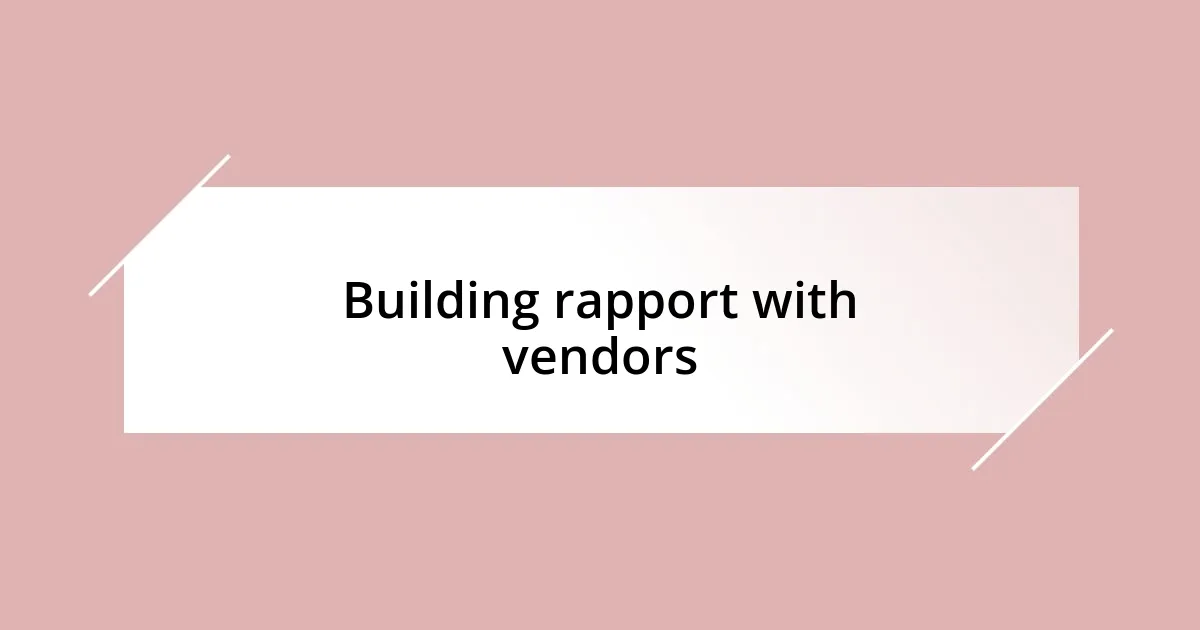
Building rapport with vendors
Building rapport with vendors is essential for successful negotiations. I’ve learned that starting conversations with a personal touch can make a world of difference. For instance, during one of my first meetings with a vendor, I noticed a family photo on their desk. I complimented it and shared a brief story about my own family. That small gesture helped to break the ice; it transformed what could have been a stiff negotiation into a more relaxed discussion. Isn’t it interesting how little moments can lead to stronger connections?
Another approach I find effective is to show genuine interest in the vendor’s business. I once asked a vendor about a recent product launch they were excited about. Their eyes lit up as they shared the challenges and successes behind it. Listening actively to their story not only enriched my understanding of their motivations but also built trust. People appreciate when you take an interest in what they do, don’t you think? It’s like saying, “Hey, I see you, and what you do matters!”
Finally, consistency in communication fosters a reliable partner relationship. I make it a point to follow up after our meetings with a simple thank you email, acknowledging something specific we discussed. This reinforces that I value their time and inputs. One vendor even mentioned that this small gesture made them feel appreciated and respected, paving the way for open dialogue in our future negotiations. Isn’t it fascinating how a little kindness can yield significant rewards in vendor relationships?
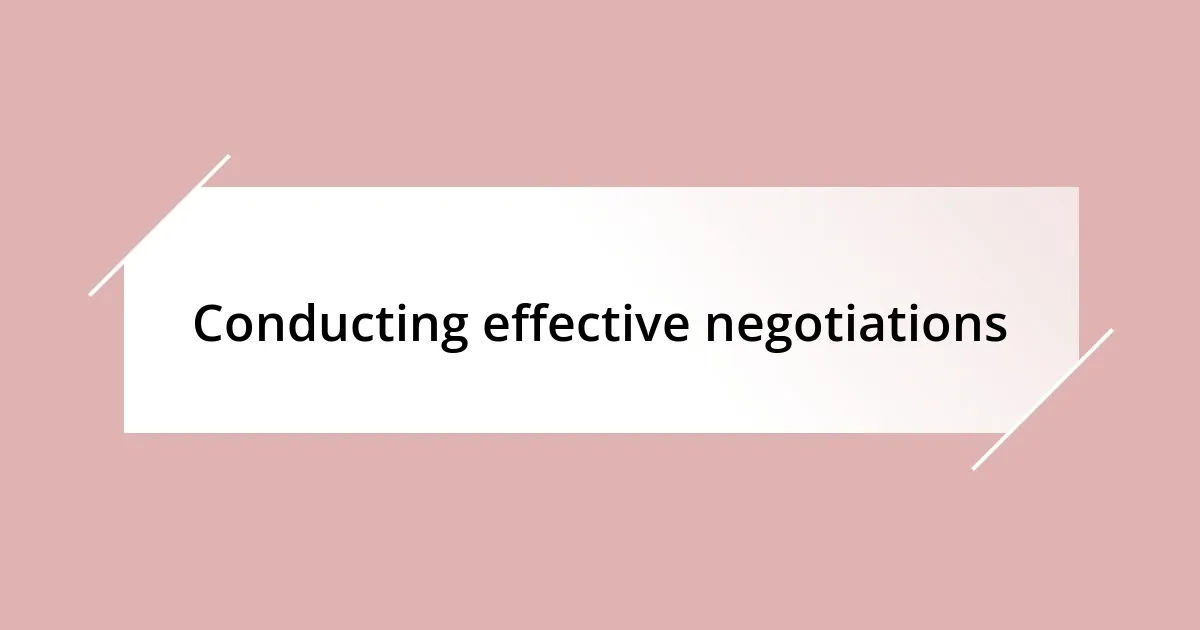
Conducting effective negotiations
Negotiating effectively is often about understanding and adapting to the dynamics of the conversation. One time, I found myself in a tense negotiation where the vendor was clearly frustrated. Instead of pushing for my terms, I paused the discussion and asked about their concerns. This simple question not only eased the tension but also opened up a dialogue that allowed us to find common ground. It’s amazing how a bit of empathy can turn a high-pressure situation into a collaborative problem-solving session.
Another key element I’ve embraced is the power of body language. During a negotiation, I make it a priority to maintain an open and approachable posture. I recall a moment when I leaned slightly forward, nodding as the vendor spoke. Their demeanor shifted from guarded to more open, which encouraged a free exchange of ideas. Isn’t it interesting how a few non-verbal cues can silently convey trust and cooperation?
Moreover, I’ve come to appreciate the value of summarizing key points during discussions. When I periodically restate what’s been said, it demonstrates that I’m actively listening and considering their perspective. In one instance, I repeated a summary of our agreement before the close of a meeting. This clarification not only reinforced our mutual understanding but also helped to highlight some areas where we could refine details further. Have you ever noticed how taking a moment to recap can clear up confusion and enhance rapport?
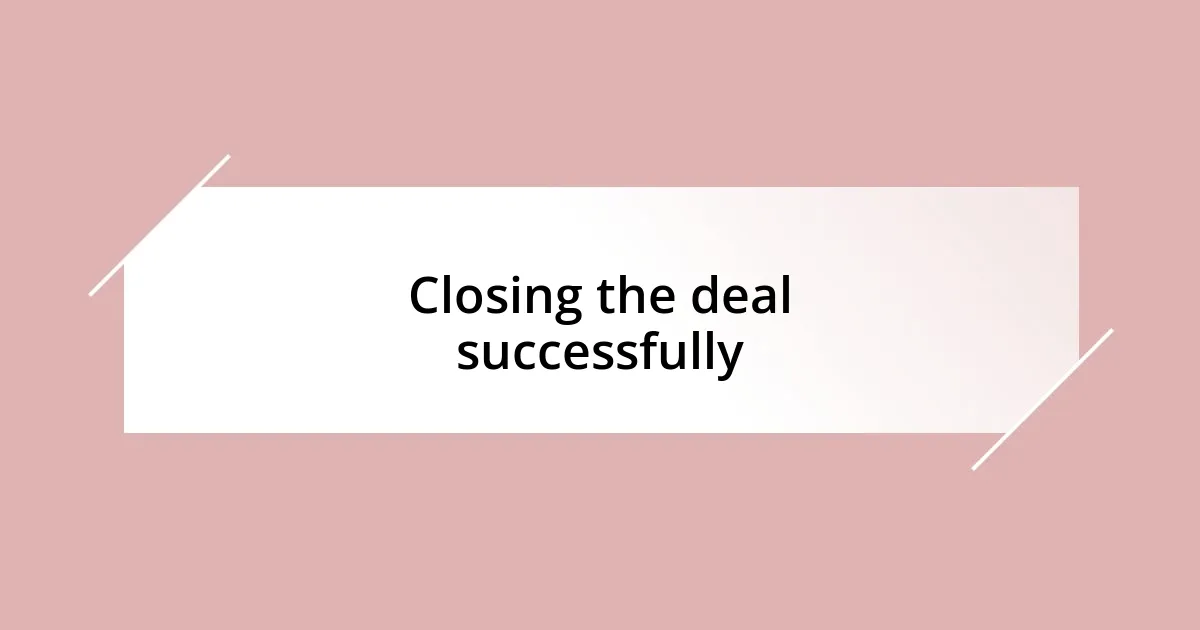
Closing the deal successfully
Closing a deal successfully often hinges on the details. I remember a time when I was wrapping up negotiations, and as we finalized the terms, I made it a point to confirm how the agreement aligned with both our goals. It felt reassuring to hear the vendor express their satisfaction about the offer—his nod and smile were priceless. Isn’t it gratifying when both parties leave with a sense of accomplishment?
As I think back to that moment, I realized that clarity is crucial. After we agreed on the terms, I took the extra step to document everything immediately. This wasn’t just about covering my bases; it was a way to reinforce trust. When I emailed the summary of our agreement, I included a personal note thanking them for their cooperation. I genuinely believed it made them feel valued and respected throughout the process. Don’t you find that when you take those additional steps, it fosters a deeper connection?
Lastly, I find it essential to always leave the door open for future conversations. After the deal was closed, I suggested we set a follow-up meeting to assess how things were going. This not only demonstrated my commitment but also established a foundation for ongoing collaboration. A vendor once told me how refreshing it was to know I was interested in nurturing our relationship beyond the contract. Isn’t that the hallmark of a successful negotiation—transforming it into a partnership?
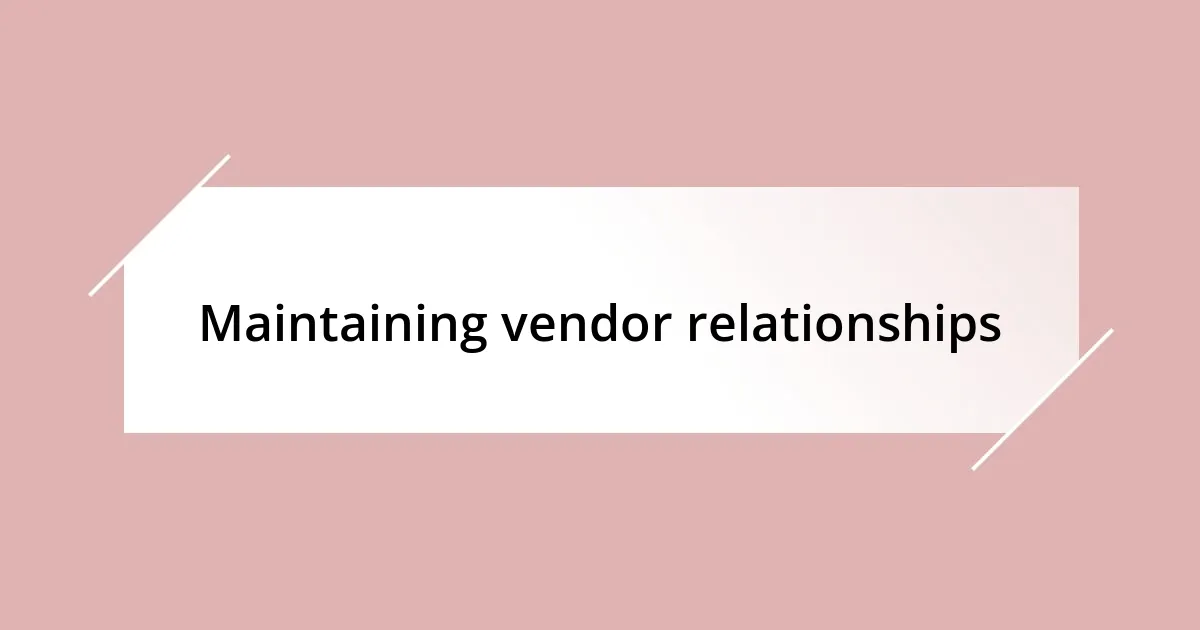
Maintaining vendor relationships
When it comes to maintaining vendor relationships, I believe that open communication is key. There was a time when I hit a snag with a supplier who had a small delay in delivery. Instead of getting frustrated, I picked up the phone and chatted with them. What surprised me was that they appreciated the honesty. We ended up brainstorming solutions together, which strengthened our working relationship. Have you ever noticed how a simple conversation can turn problems into opportunities?
In my experience, showing appreciation goes a long way. I remember a vendor who exceeded my expectations on a project. I took the time to send a handwritten note thanking them for their hard work. Their response was so heartfelt; they mentioned how rare it is to receive such acknowledgment. This little gesture not only made their day but also deepened our trust. Isn’t it true that people often remember how you made them feel?
Listening actively might seem basic, yet it’s incredibly powerful. During one of my regular check-ins with a vendor, I focused entirely on their feedback regarding our ongoing collaboration. Their insights revealed areas I hadn’t even considered, and I was genuinely grateful for their input. By integrating their suggestions, we improved not just the project but also our teamwork. Don’t you think that truly listening is a way to validate our partners and set the stage for long-term success?








